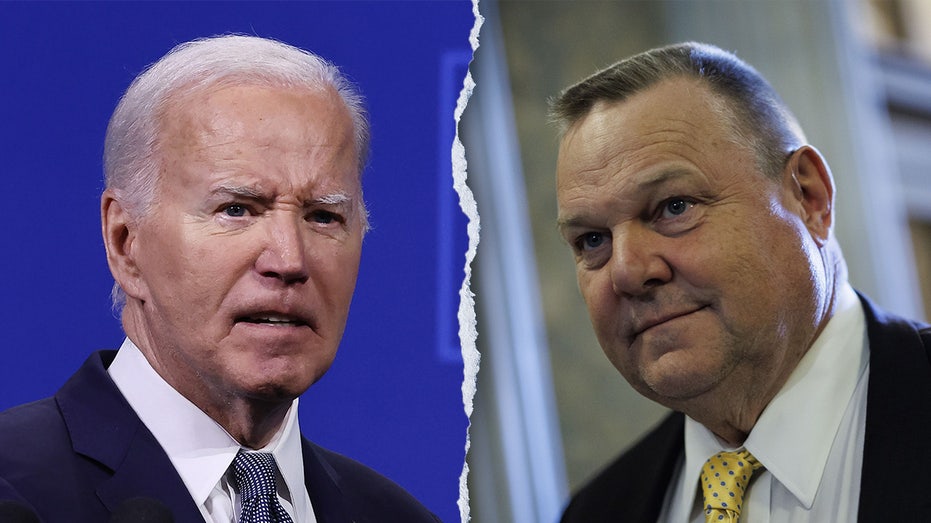Biden has a high-tech problem in Michigan
Biden sold a tax break by pumping up a Michigan microchip supplier — then left the company out in the cold.


When President Joe Biden signed the 2022 CHIPS and Science Act into law, aiming to boost America’s once-dominant microchip industry, he gave a special callout to Hemlock Semiconductor — a 63-year-old company in central Michigan that leads the nation in making a single, crucial high-tech material.
Biden held it up as an example of exactly what he wanted the new law to support.
“Nearly one-third of all the chips in the world use polysilicon made in Hemlock,” Biden said in a speech from the White House South Lawn. “Imagine if we had more of these kinds of factories across the country. This law will make that a reality.”
Now the administration is getting ready to unleash the law’s flood of tax breaks — estimated to be worth more than $25 billion over a decade. But instead of supporting Hemlock, the Treasury Department and Internal Revenue Service have proposed rules that would cut the company out. Lawmakers say Biden and the administration are not meeting the intent of the law.
That tension — between the aspirations of the law that Biden articulated on the South Lawn and the way his administration is implementing it— is fueling frustration within the president’s party in a crucial swing state. Sen. Gary Peters, a Michigan Democrat, said he had raised concerns about the implementation of CHIPS in a direct conversation with Biden, as well as with other members of the administration.
“Chip-grade polysilicon manufacturers are essential," Peters told POLITICO. "I’ll keep fighting to ensure they receive the federal support.”
With the deadline for final rules approaching, the company has mobilized its supporters, including the popular governor of Michigan, to push the administration to open up the benefit more widely. Their argument highlights a key challenge of the fast-evolving Biden policy to bolster America’s role in a crucial global industry: Where to draw the line on which companies merit taxpayer support as part of the $526 billion semiconductor industry and which are left out in the cold.
When the first draft of the CHIPS tax credit rules was released last March, it only offered breaks to companies that made finished chips and the machines used to print them. Hemlock and other firms that supply the industry weren’t included.
Since then, those firms have been making the case that the guidance is too narrow — and politicians connected to the industry have rallied to their side.
In November, Michigan’s Democratic Gov. Gretchen Whitmer wrote to Biden, warning that his made-in-America chip policy would fail if it didn’t support suppliers like Hemlock. “[W]e risk losing our future to China,” she wrote. The same month, all nine Michigan Democrats in Congress wrote to Treasury Secretary Janet Yellen, saying expanding U.S. leadership in the industry will “only be possible” if semiconductor-grade polysilicon producers can get the tax break as they argue the act intended.
The final tax rules were initially planned for December, but were pushed back to June, and observers want to get certainty much sooner. Now, suppliers are increasingly on edge, worrying if their months-long campaign will pay off.
Their supporters in Congress, too, say they will push until the rules are out.
Keeping the base of the semiconductor supply chain in America was “one of the explicit reasons that the CHIPS and Science Act was passed and signed into law in the first place,” Bobby Leddy, spokesperson for Whitmer, told POLITICO. He said her office is "keeping our foot on the gas" as it works with the Congressional delegation and federal partners.
Rep. Dan Kildee, who led the Michigan Democrats’ letter, said via a spokesperson that though they did not get a response from the White House, he and his office continue to have regular conversations with Yellen, National Economic Council Director Lael Brainard, and Commerce Secretary Gina Raimondo.
Hemlock’s case is that it’s the nation’s leading maker of the raw material at the heart of most microchips, processing quartz and refining it into rocks of ultra-pure polysilicon that a slate of other companies will turn into the next microchips. It employs more than 1,300 people, part of a complex network of firms whose work underlies chipmaking itself.
But more than half the elements on the periodic table have been used in semiconductor manufacturing — and seemingly, just as many companies have argued they deserve a piece of the CHIPS pie, including industrial gas and chemical makers whose products go into chipmaking. In the CHIPS Act’s early days, lobbyists from all over angled for a payout, including the social media company Snap, FedEx, and others with an unclear connection to microchips.
“There are arguments to be made for pretty much every part of the supply chain when you start talking about upstream stuff that goes into the manufacturing process,” said John VerWey, a research fellow at Georgetown’s Center for Security and Emerging Technology. “Is it more important to reshore stuff we don't already do here or support the stuff we already do?”
While materials producers can apply to receive funds from a separate $39 billion grant program under CHIPS, the tax credit is “highly important” because it does not have a competitive application process and further reduces the cost of building a large polysilicon plant, which can be up to $2 billion, said Bob Moczulewski, a director at tax firm Baker Tilly. The credit covers 25 percent of qualifying investments in facilities.
For some big players, the tax credit is already paying off. Since CHIPS became law, those firms — including the giants Intel and TSMC — have announced more than $230 billion in semiconductor investments, according to the White House. But the polysilicon industry, still hoping to be in the final rules, has not announced any investments to expand production through new facilities like the ones Biden described.
Last July, Hemlock CEO A.B. Ghosh told IRS officials at a hearing that the company would be unable to expand its domestic polysilicon production “without the support of the federal government.”
“Without these incentives, the U.S. will likely see smaller, incremental investments over time,” Tara Zachariah, a Hemlock spokesperson, said in an email.
If chip suppliers can’t get tax benefits, the companies and their supporters caution the microchip supply chain will increasingly drift overseas. They raise the specter of silicon-based solar panels — another American invention — where China deployed state funding to overtake U.S. and Japanese firms and become the world’s largest supplier, a problem now complicating Biden’s climate agenda.
China hasn’t cracked the code to mass-produce the polysilicon used by the semiconductor industry yet, which needs to be brought to ultra-high levels of purity: 99.999999999% — eleven nines. But advocates say it’s just a matter of time before Chinese producers chip away at Western firms’ dominance.
The rollout of other CHIPS Act provisions offers mixed signals on how the final tax credit rules might come down. In September, the Commerce Department issued final rules on national security for CHIPS incentive awardees. It clarified that another type of supplier, wafer producers, would indeed be considered semiconductor manufacturing, but did not weigh in on polysilicon.
The White House referred questions about the rules’ status to the Commerce Department, which referred questions to the Treasury Department. A spokesperson for Treasury declined to comment on the rules’ timing and contents.



